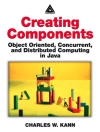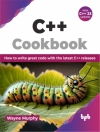The unique book advances understanding of modelling complex systems using hybrid approaches that combine discrete-event, agent-based, and system dynamic simulations with research approaches and artefacts from other scientific disciplines.
As systems become increasingly large and complex, it is a challenge to capture the intricacies of the underlying system and offer novel forms of analysis using only models that employ a single simulation technique. The book underscores the importance of both hybrid simulation (employing techniques primarily developed in the field of modelling and simulation) and hybrid modelling (incorporating simulation with methods from wider disciplines such as applied computing, data science, engineering, and soft/qualitative operations research). Furthermore, the text aims to inspire further research and practice, fostering the growth of cross-disciplinary hybrid models.
Topics and features:
- Provides a comprehensive overview of hybrid modelling and simulation, including methodological extensions and novel applications
- Features case studies and examples demonstrating the synergy realized by applying hybrid methods
- Calls for innovation and growth of the discipline by incorporating diverse scientific perspectives
- Encourages adoption of interdisciplinary methods to engender improved insights from simulation studies
- Promotes interdisciplinary collaboration, pushing modelling and simulation into new research and application areas
This comprehensive volume will appeal to researchers, academics, students, and practitioners who seek to advance their modelling and simulation work. The book also will serve as a reference, informing research communities of the potential of hybrid models that combine simulation with disciplinary research artefacts, methods, and approaches.
Innehållsförteckning
1. Introduction to Hybrid Modelling and Simulation.- 2. Hybrid Modeling and Simulation Concepts for Complex Socio-Technical Systems.- 3. Network-based Operational Modelling for Informing Inter-organisational Healthcare Simulation Conceptual Modelling.- 4. Modeling and Simulation of Software Product Lines with the Hy Flow Formalism.- 5. Event Scheduling Approach for Simulating Agents with Behaviours.- 6. Hybrid M&S with Digital Twin Technology.- 7. Using the Modelling Frame to Maximize the Advantages of Hybridization During the Conceptual Modelling Process.- 8. Hybrid Simulation in Healthcare Applications.- 9. Hybrid Modelling Approach Using ML (RL) in Conjunction with Simulation.- 10. Hybrid Conceptual Modelling of Complex Dynamical Social Systems.- 11. Use of Hybrid Modelling and Simulation Method with Techniques from Wider Operations Research like ARIMA Forecasting.- 12. Conceptual Modelling for Hybrid M&S.- 13. Automated Methods for Model Building.- 14. Discrete-Event System Specification Modeling for the Development of Cyber-Physical Systems.
Om författaren
MASOUD FAKHIMI is an Assistant Professor of Operational Research at Surrey Business School, University of Surrey, UK. His research interests include modeling and simulation methodologies and their applications in areas such as sustainability, Industry 4.0, supply chain management, and healthcare. He has been involved in several multidisciplinary research projects with stakeholders from industry and academia across healthcare, education, and agri-chains. He is also a Fellow of the People-Centred AI Research Centre at the University of Surrey. Additionally, he chairs the UK Operational Research Society’s Simulation Special Interest Group (SIG) and the Education Committee for the Association for Computing Machinery (ACM) – Special Interest Group in Modeling and Simulation (SIGSIM).
NAVONIL MUSTAFEE is a Professor of Analytics and Operations Management at the Centre for Simulation, Analytics and Modelling (CSAM), University of Exeter Business School, UK. His research focuses on simulation methodologies, including hybrid modelling & simulation and digital twins, and their application in healthcare, supply chain management, circular economy and climate change adaptation and resilience. His research has received funding from European and UK funding bodies (EU Horizon, EPSRC, MRC, NIHR), charities, and industry funding from the UK NHS. In 2022, he was awarded the UK Operational Research Society’s prestigious Lyn Thomas Impact Medal award for work on reducing A&E/ED peak time demand and the NHSquicker platform. He is a Joint Editor-in-Chief of the Journal of Simulation and leads the Africa Focus initiative for the journal.












